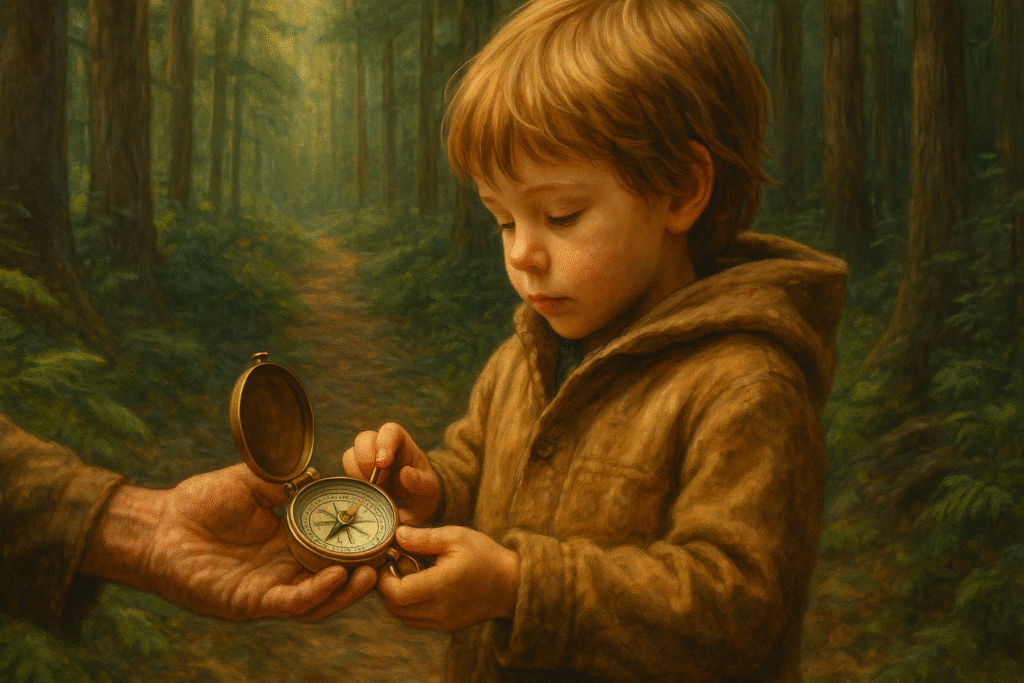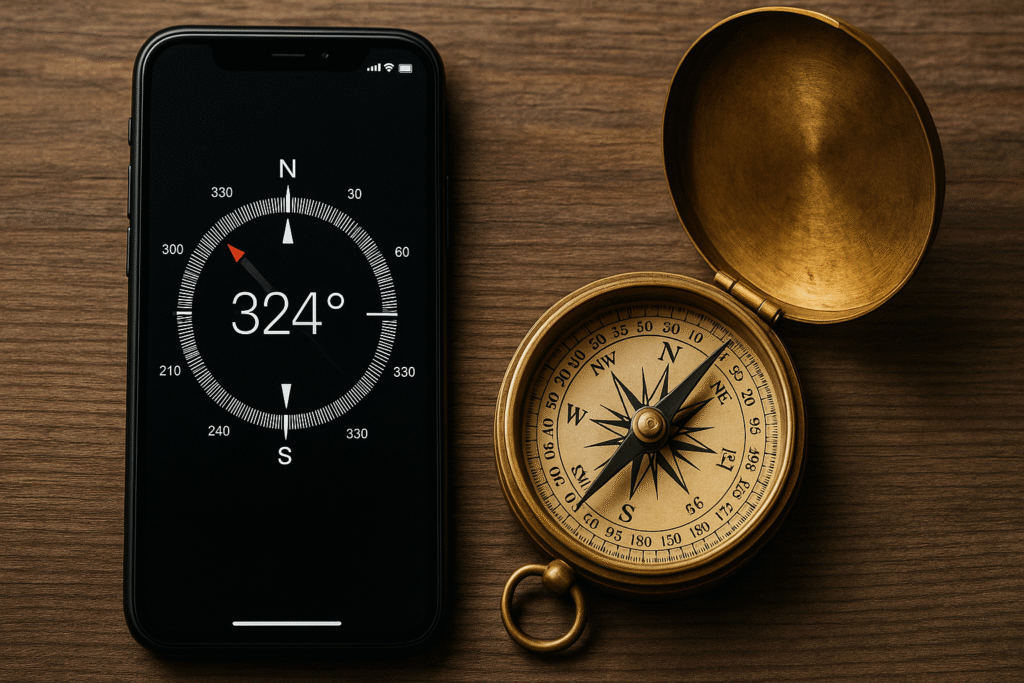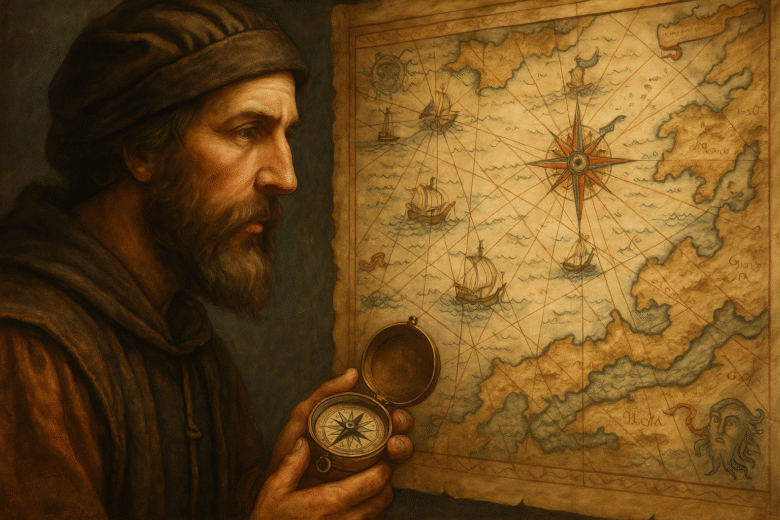Fun fact: The earliest compasses were made of lodestone, a naturally magnetized rock, and were used not for navigation—but for divination in ancient China!
Picture this: You’re lost in a dense forest with no GPS (Global Positioning System), no phone signal, and the sun is hidden behind thick clouds. You reach into your backpack and pull out a small, simple device—a compass. It points north, steady as ever, anchoring you in space when everything else feels unmoored. We rarely stop to appreciate this tiny tool today, but once upon a time, the compass did nothing less than reorient the entire world.
In this blog, we explore how the humble compass changed civilization forever—and why we now take it completely for granted.
A Needle That Pointed the Way to Empire
The compass is often lumped into the background noise of historical inventions—useful, yes, but not exactly sexy. It doesn’t dazzle like the internet or explode like gunpowder. And yet, when it emerged in China around the 11th century during the Song Dynasty, it altered the very geometry of human understanding.
Before the compass, navigation depended on stars, landmarks, wind patterns, and an unhealthy amount of luck. Sea voyages hugged coastlines. Desert caravans relied on memory and myth. But a magnetic needle floating in water or pivoting on a pin? That was sorcery made practical.
With it, explorers could navigate in the dark, through storms, across open oceans. Empires suddenly expanded their borders by sea. The Silk Road gained a maritime twin. Trade networks flourished, maps evolved, and the Age of Exploration was born—not because humans suddenly became braver, but because they had a directional cheat code.
China’s Hidden Gift to the World
The origin of the compass is no mystery—it was Chinese, and it was revolutionary. But it’s often overshadowed in Western history books by the explorers it empowered: Columbus, Vasco da Gama, Magellan.
Ancient Chinese texts describe a “south-pointing spoon” made of lodestone placed on a bronze plate. This early compass was used for geomancy (feng shui) and battlefield alignment long before it was a maritime tool. By the 11th century, Chinese navigators were using it to sail the South China Sea, revolutionizing trade and connecting ports across Asia.
From China, the knowledge trickled into the Islamic world, and from there into Europe. But by the time the compass reached Western shores, its origins were largely erased—yet another case of historical amnesia in service of empire.

The Compass and the Conquest of the Seas
Once the magnetic compass entered Europe in the 13th century, it was game on. The Mediterranean was mapped with new confidence. By the 15th century, navigators like Henry the Navigator of Portugal were building schools of exploration around this tool.
Then came the seismic shift: transoceanic voyages. Without the compass, Columbus doesn’t “discover” the Americas (at least not in 1492). Vasco da Gama doesn’t reach India. Magellan doesn’t circumnavigate the globe. These weren’t just trips—they were tectonic shifts in global power.
Suddenly, Europe wasn’t just a set of feuding kingdoms. It was a launchpad for colonialism, conquest, and capitalism—all enabled by a floating sliver of iron pointing toward magnetic north.
Mapping the World, Mapping the Mind
The compass didn’t just change geography—it rewired how we think.
Consider this: before the compass, “north” was not always the default. Different cultures used the sun, stars, rivers, or even sacred trees to define direction. But with the magnetic compass came a fixed, globalized orientation. “North” became the standard. Maps started to align with magnetic poles. Cartography became a science. The world began to look the same to everyone—because everyone was now using the same reference point.
This standardization of space had deep psychological effects. It enabled the idea of the “world map” as a universal truth rather than a local myth. It helped people conceptualize global travel, empire, and even the planet as a whole—a giant sphere that could be navigated and conquered.
Why We Don’t Care Anymore
Here’s the twist: the more a technology integrates into daily life, the less we notice it. Today, your smartphone contains a digital compass, paired with GPS, gyroscopes, accelerometers, and more. But when was the last time you thought about the compass itself?
We tap “directions” and expect turn-by-turn navigation across entire cities. We fly across continents, trusting pilots guided by instruments that trace their lineage back to a magnetic needle. The compass made possible everything from Google Maps to space missions—but it gets no credit. It became so good, so reliable, so there that we forgot it even existed.
The Compass in Culture: Symbol and Metaphor
The compass didn’t just alter trade—it became a cultural icon. Poets, politicians, and philosophers adopted it as a metaphor for truth, purpose, and direction.
- Ralph Waldo Emerson wrote of a “moral compass.”
- Captain Jack Sparrow had a magical one that pointed to what he desired most.
- Even corporate logos (like outdoor gear company Suunto, a Finnish manufacturer of navigational equipment) use compass imagery to evoke exploration and trust.
And yet, in the age of digital maps and instant updates, the symbol risks becoming hollow. We wear compass pendants without ever wondering if we’re truly navigating—or just being steered.

What Happens When We Lose Our Bearings?
In a world that prizes efficiency, we’re ironically more directionless than ever. Our phones tell us where to go, but not why. We follow blue lines on screens, but ignore the bigger questions of purpose and place.
If the compass once launched centuries of exploration, what tool do we have today to help us navigate life itself?
The answer might be metaphorical. A renewed curiosity. A sense of awe. An understanding of history. Because if we forget the compass, we forget how we ever got here—and how easily we can get lost again.
Conclusion: Reorienting Ourselves
The story of the compass is a story of quiet, persistent revolution. It didn’t roar into history like fire or thunder like gunpowder. It whispered. It pointed. And humanity followed.
So the next time you use GPS or stare at a map, remember: none of it would exist without that simple, brilliant tool invented a thousand years ago. The compass changed civilization. Maybe it’s time we stopped taking it for granted—and asked what it might still teach us about finding our way in a chaotic world.
Author’s Note
I’ve always been fascinated by the hidden heroes of history—the tools and ideas we no longer think about but that shaped everything. The compass is one such hero. Writing this was a reminder to pay attention to the small things that move the world.
G.C., Ecosociosphere contributor.
References and Further Reading
- National Geographic – The Magnetic Compass
- The Smithsonian – The Compass and Navigation History
- Stanford History Education Group – Teaching With Compasses




